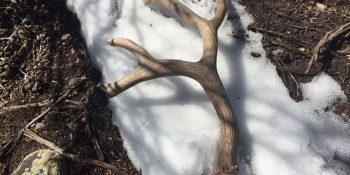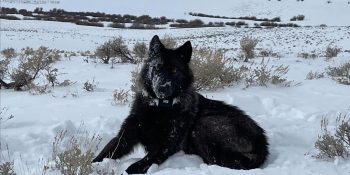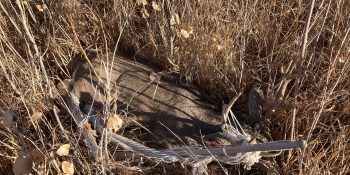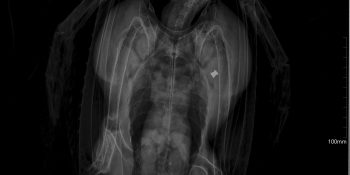FAIRPLAY, Colo. – To protect wintering big-game animals and sage grouse species, Colorado Parks and Wildlife reminds the public that the collection of shed antlers on all public lands west of I-25 is prohibited from Jan. 1 through April 30.
This closure, in place since 2018, is intended to protect wintering animals from unnecessary human disturbance during the late winter months when ungulate body condition is at its worst.
Big game and sage grouse species live in a basic survival mode during the winter when food is scarce. If forced to move and burn calories unnecessarily, wildlife can lose vital energy stores that they put on in the summer and fall to help last them until the spring green-up.
“Big game animals are already having a hard enough time nutritionally during winter, so the more energy they burn from human disturbance will cause them to burn the energy that is crucial in helping them to make it through the winter,” said Lance Carpenter, Senior Wildlife Biologist for CPW’s Northeast Region. “It is hard enough already for them.”
In addition to the statewide restrictions, additional special regulations are also in place for the Gunnison Basin. In Game Management Units 54, 55, 66, 67 and 551, it is illegal to search for or possess antlers and horns on public lands between legal sunset and 10 a.m. from May 1 through May 15.
Shed antler collecting has become very popular. The interest in personal and commercial collection has led to a substantial increase in the number of people searching for antlers across big-game winter range in Colorado. The seasonal prohibition applies to both commercial and personal collectors.
It is not just those out there looking to find shed antlers that can stress wintering wildlife either. Carpenter encourages those participating in all forms of winter recreation that if you see wildlife, give them a wide berth.
“When you are out there in the winter time, you don’t want to disturb the animals,” he said. “You don’t want to go up close to them, get close-up pictures, you don’t want to make them walk away from what they are doing. Go the other way if you can. They are most vulnerable this time of year.”
Wildlife officers and biologists continue to educate the public about the negative impacts to wildlife caused by irresponsible shed collection and winter recreational activity. Violators of these regulations may face a $137 fine per violation, in addition to separate fines for illegal possession of each shed antler and the five license suspension points that are assessed for each violation.
In addition, apart from the shed collection rules, harassing wildlife remains illegal and CPW officers will cite individuals for violating this regulation, too. Harassing wildlife includes a $137 fine that also carries 10 license suspension points.
To learn more about shed hunting restrictions, please see this question and answer section on shed antlers on our website.
Colorado’s cervids (members of the deer family) drop or cast their antlers at different times in the winter. When that happens is variable based on the age and condition of the animal.
“The harder the winter conditions and poorer condition the animal is in, the earlier they will drop,” said Andy Holland, Big Game Manager for CPW. “Generally, mature animals will cast antlers earlier.”
Deer in Colorado are known to shed their antlers from mid-January through March. Elk may start in February, running through April and moose typically drop their palmate antlers November through January.
Category: Colorado News
-

CPW issues reminder of seasonal restrictions on shed antler collection
-

CPW locates, collars gray wolf pup in North Park
A photo of 2202, the first gray wolf born and collared in Colorado. The female pup was fitted with a GPS collar in North Park on Feb. 9.
Image: CPW/Eric OdellWALDEN, Colo. – Colorado Parks and Wildlife placed a GPS collar on a female wolf pup in North Park, Colorado, on Wednesday, Feb. 9. The collared pup will be identified as 2202. The first two numbers (22) indicate the year the animal was captured. The second set of numbers inform biologists of the wolf’s gender (males will have odd numbers, females will have even) and the order in which it was collared.
The pup is one of six produced by female wolf F1084 and male wolf 2101 in 2021, meaning the newly collared pup is one of eight wolves in the North Park area. F1084 is known to have migrated to Colorado from the Snake River Pack in Wyoming from a previously-fitted collar. That collar had stopped transmitting, leading to the decision to fit a GPS collar onto another member of the pack.
“The second GPS collar in this pack will allow our biologists and wildlife managers to learn more about the behavior of these naturally migrating wolves,” said CPW Director Dan Prenzlow.
During the collaring effort, a CPW-contracted company safely darted the animal with a tranquilizer from a helicopter, allowing the collar to be fitted by field staff on the ground. 2202 is the first gray wolf born and collared in Colorado.
“The wolf pup was given a health exam during the collaring process and appears to be in good health,” said CPW Terrestrial Section Manager Brian Dreher.
It is worth noting that, while collars provide valuable information, they only provide a snapshot and are not monitored in real time. The primary tools used by wildlife officers are field observations of physical evidence such as wolf prints and scat during field investigations to verify the presence of wolves on the landscape.
CPW also encourages the public to use its wolf sighting form if they see a suspected wolf. Any personal observations, photos or videos taken can help inform CPW staff and fill in the gaps as to wolf activity in the state.
Gray Wolves remain a State Endangered species, and wolves may not be taken for any reason other than human self-defense. Illegal take of a wolf may result in a combination of penalties, including fines of up to $100,000, a year of jail time, and a lifetime loss of hunting license privileges.
-

Statement from Colorado Secretary of State Jena Griswold Regarding the Investigation of a Potential Breach in Security Protocol in Douglas County
Denver, February 3, 2022 – Today, Colorado Secretary of State Jena Griswold released the following statement regarding the investigation of a potential breach of security protocols for voting system equipment in Douglas County and the Election Order issued to Douglas County Clerk and Recorder Merlin Klotz requiring the disclosure of relevant information.
“My office became aware of a potential unauthorized imaging of a Douglas County voting equipment server. The Douglas County Clerk has failed to respond to an email request requiring disclosure of information about this potential breach in election security protocol.” said Secretary Jena Griswold. “To ensure the security of Douglas County’s voting equipment, I am issuing an Election Order requiring the Douglas Clerk to disclose information regarding the imaging of the election equipment server. As Secretary of State, I will continue to protect Colorado’s election infrastructure to ensure that every eligible Coloradan – Republican, Democrat, and Independent, alike – has access to secure elections.
”On January 28, 2022, the Secretary of State’s Office became aware of the potential security protocol breach when it was alerted to a social media post attributed to Douglas County Clerk and Recorder Merlin Klotz which asserts Clerk Klotz stated that “a full image backup of our server before a trusted build was done this year” was taken. On January 28, 2022, the Department of State sent Clerk Klotz an email requesting information regarding the alleged incident, with an answer due to the Department of State by January 31, 2022. Clerk Klotz did not answer and has not answered.
Today, the Secretary of State sent an Order to Clerk Klotz requiring the disclosure of information regarding the copying of the election server, requiring that video surveillance of voting equipment be activated, and that no one access the voting equipment unaccompanied.
This potential breach in security protocol reportedly occurred prior to the 2021 trusted build of Douglas County’s 2021 voting equipment, which updates systems against vulnerabilities. Therefore, the Secretary of State’s Office does not believe at this time that the unauthorized imaging has created an imminent or direct security risk to Colorado’s elections.
-
Taxpayer alert as holidays, tax season approach
Watch out for scams, protect financial information; National Tax Security Awareness Week, Day 1 highlights important tips
IRS YouTube Video:
Security Measures Protect Against Tax-Related Identity Theft – English
WASHINGTON — Kicking off a special week, the Internal Revenue Service and the Security Summit partners today warned taxpayers and tax professionals to beware of a dangerous combination of events that can increase their exposure to tax scams or identity theft.
The combination of the holiday shopping season, the upcoming tax season and the pandemic create additional opportunities for criminals to steal sensitive personal or finance information. People should take extra care while shopping online or viewing emails and texts.
The IRS, state tax agencies and the nation’s tax industry – working together as the Security Summit – mark today’s start of the 6th annual National Tax Security Awareness Week with tips on basic safeguards everyone should take. These can help protect against identity theft as well as help safeguard sensitive tax information that criminals can use to try filing fake tax returns and obtaining refunds.
“Don’t let this be the most wonderful time of the year for identity thieves,” said IRS Commissioner Chuck Rettig. “The approach of the holidays and tax season increases risk for taxpayers and opportunities for criminals. We urge people to be extra careful with their personal and financial information during this period while shopping online or getting suspicious emails or text. Taking a few simple steps can keep people from becoming victims of identity theft and protect their sensitive personal information needed for tax returns and refunds.”
Since 2015, the IRS and Security Summit partners have taken important steps to protect taxpayers and the nation’s tax professionals from tax-related identity theft. But progress in this area led identity thieves to evolve their tactics, trying to obtain sensitive information from taxpayers and tax professionals to help prepare fraudulent tax returns. Taxpayers can help in this fight by protecting their financial and tax information. Summit partners continue to highlight safety steps in the “Taxes.Security.Together” effort.
As part of that effort, National Tax Security Awareness Week is designed to help share information with taxpayers and tax professionals during this critical period. The special week includes special informational graphics and social media efforts on platforms including Twitter and Instagram through @IRSnews and #TaxSecurity.
A special emphasis for this year on social media will be focusing tax security awareness on younger and older Americans. Even if someone doesn’t file a tax return, their online interactions can lead to scam artists obtaining sensitive information and using it to try obtaining a refund.
10 key steps to protect sensitive information:
To help taxpayers and tax professionals, the Security Summit offers 10 basic steps everyone should remember during the holidays and as the 2022 tax season approaches:
- Don’t forget to use security software for computers, tablets and mobile phones – and keep it updated. Protect electronic devices of family members, especially teens and young children.
- Make sure anti-virus software for computers has a feature to stop malware, and there is a firewall enabled that can prevent intrusions.
- Phishing scams – like imposter emails, calls and texts — are the No. 1 way thieves steal personal data. Don’t open links or attachments on suspicious emails. This year, fraud scams related to COVID-19, Economic Impact Payments and other tax law changes are common.
- Use strong and unique passwords for online accounts. Use a phrase or series of words that can be easily remembered or use a password manager.
- Use multi-factor authentication whenever possible. Many email providers and social media sites offer this feature. It helps prevent thieves from easily hacking accounts.
- Shop at sites where the web address begins with “https” – the “s” is for secure communications over the computer network. Also, look for the “padlock” icon in the browser window.
- Don’t shop on unsecured public Wi-Fi in places like a mall. Remember, thieves can eavesdrop.
- At home, secure home Wi-Fis with a password. With more homes connected to the web, secured systems become more important, from wireless printers, wireless door locks to wireless thermometers. These can be access points for identity thieves.
- Back up files on computers and mobile phones. A cloud service or an external hard drive can be used to copy information from computers or phones – providing an important place to recover financial or tax data.
- Working from home? Consider creating a virtual private network (VPN) to securely connect to your workplace.
Other common warning signs; additional places for information
The IRS and Summit partners continue to see identity thieves trying to look like government agencies and others in the tax community by emailing or texting about tax refunds, stimulus payments or other items. Remember, the IRS will not call or send unexpected texts or emails about things like refunds. More information about these common scams is available at IRS Tax Tip: Common tax scams and tips to help taxpayers avoid them.
The IRS and Security Summit partners are sharing YouTube videos on security steps for taxpayers. The videos can be viewed or downloaded at Easy Steps to Protect Your Computer and Phone and Here’s How to Avoid IRS Text Message Scams.
Employers also can share Publication 4524, Security Awareness for Taxpayers (.pdf), with their employees and customers while tax professionals can share with clients.
In addition, the Summit partners remind people these security measures include mobile phones – an area that people sometimes can overlook. Thieves have become more adept at compromising mobile phones. Phone users also are more prone to open a scam email from their phone than from their computer.
Taxpayers can check out security recommendations for their specific mobile phone by reviewing the Federal Communications Commission’s Smartphone Security Checker. Since phones are used for shopping and even for doing taxes, remember to make sure phones and tablets are just as secure as computers.
During the pandemic, there continue to be numerous scams related to COVID-19. These can be attempts to gain sensitive personal or financial information. The Federal Trade Commission also has issued alerts; consumers can keep atop the latest scam information and report COVID-related scams.
The IRS, state tax agencies, the private sector tax industry, including tax professionals, work in partnership as the Security Summit to help protect taxpayers from identity theft and refund fraud. This is the first in a week-long series of tips to raise awareness about identity theft. See IRS.gov/securitysummit for more details.
-

ACSO PARTICIPATES IN NATIONAL FAITH & BLUE WEEKEND

St. Isidore Catholic Church, Watkins, CO

Our Lady of Help Christians Academy, Watkins
Our sheriff deputies kicked off National Faith and Blue Weekend with the adorable kindergarten class at Our Lady Help of Christians Academy in Watkins. The day was all about partnering with the faith community and sharing what we do to help make our neighborhoods stronger and safer. The school was so excited to see us, they wrote all about their experience HERE.
The 2021 National Faith & Blue Weekend was held October 8 – 11, 2021. More than 2,000 events and activities were conducted across the country between law enforcement agencies and faith-based organizations.

The heart and mission of National Faith & Blue Weekend is that policing can only rise to the challenge of providing safety and equal justice if it has the collaboration of the people they protect and serve. Learn more Faith and Blue below.
https://youtu.be/KSK9UJ07wTY -

Remove tangle hazards from yards to protect wildlife

A buck entangled in a hammock in Parker, Colo. on Friday, Oct. 29. (photo courtesy of CPW) DENVER – Deer are on the move at this time of year migrating and looking for mates. But the animals are prone to getting tangled in summer gear left in backyards, or in decorations and lighting that are beginning to come out as we approach the holiday season. Colorado Parks and Wildlife urges everyone to take down volleyball nets, hammocks and secure hanging lights that deer – especially bucks – can get tangled in.
On Tuesday in Evergreen, two bucks were tangled together in a badminton net. One buck worked itself free before wildlife officers arrived. They were able to untangle the second buck after tranquilizing it.
Last Friday in Parker, wildlife officers had a buck that died from a hammock being wrapped around its head and body, cutting off circulation to its back leg. CPW has already handled a number of elk entanglements this fall as well.
Death is a possibility when it comes to entanglements, whether immediate or down the road. The stress and exhaustion that comes with these conflicts and the animal frantically trying to free itself, is a danger to wildlife.
“We are starting to see more instances of deer becoming tangled in the last two weeks and it will get worse as we get into the rut,” said Wildlife Officer Casey Westbrook. “We are seeing activity increase in deer starting to spar and their general rutting activity and movements are picking up. When in the rut, we see a lot more entanglements.”
The rut – or breeding season – for deer enters its peak in mid-November and will last through mid-December.
During this time, bucks have a one-track mind – they want a mate. So they can become agitated if any other animal, object or person appears to be posing a challenge. Dogs are often targets and they can be badly injured by a buck’s antlers.
Deer can become aggressive toward humans too, so stay well away from them. Do not try to get close for that selfie. Attacks get reported around the state each fall.
Wildlife officers can often get deer untangled if they are nearby and are told about it. In some cases they cut off the animal’s antlers to free it, in other instances they can remove the object. Some cases do not require assistance if the entanglement is not preventing the animal from eating or drinking, or if there is low risk that the animal could get caught up in other items that would prevent it from being mobile.
Over the years, CPW has seen deer, elk and even moose tangled with a variety of items, including: tricycles, tires, garden cages, clothes lines, plastic fencing, lawn chairs, Christmas lights and more.
“Oftentimes we go through heroic efforts to save the animal, but sometimes we can’t save them,” Westbrook said.
As people begin to hang outdoor Christmas ornaments, CPW recommends that lights and other decorations be placed above six feet or attached tightly to trees and buildings. Lights that hang low or that are draped insecurely over vegetation can get tangled easily in antlers.
“At this time of year more deer are seen on the roads and they are also in the middle of the rut,” said Matt Martinez, area wildlife manager in the Denver metro area. “People need to take down the things in their yards that snag antlers and slow down as they’re driving.”
If you see wildlife that does become entangled in anything, wildlife officials ask that you report that directly to CPW by calling an office local to you (the Denver office number is 303-291-7227), or through Colorado State Patrol if it is outside of normal business hours. When calling CSP at 303-239-4501, they will relay your information on to the on-call wildlife officer.
Detailed information wildlife officers would like to know about when it comes to entanglements includes: is the animal mobile or is it tied to an object, is it preventing the animal from eating/drinking/breathing, location, time first observed, what is it entangled in and the behavior of the animal (what it is doing).
You can learn more about living with wildlife by visiting our website.
Photos Below (courtesy CPW)
Left: A buck tangled in a hammock in Lakewood on Sept. 15, 2021
Right: A buck entangled in a badminton net in Evergreen on Nov. 2, 2021

-
Early In-Person Voting Begins Statewide Today
DENVER, Colo– Voter Service and Polling Centers (VSPCs) across Colorado are now open statewide for the November 2 Coordinated Election, enabling Coloradans to vote or drop off their ballots in-person. To date, 313,372 ballots have been returned.
“Colorado historically has been engaged in the state’s elections, and we expect that will continue,” said Colorado Secretary of State Jena Griswold. “With more available drop boxes statewide than ever before, along with nearly 150 voting centers, it’s accessible to make sure your voice is heard in our democracy.”
Drop boxes and VSPCs must be open today statewide, but some counties opened some drop boxes and VSPCs earlier. This year, 405 drop boxes and 147 VSPCs are available statewide for Colorado voters. To find the nearest drop box or VSPC, voters can use a search tool located on the Colorado Secretary of State’s website. Once again, voters across the state can also track their ballots from when they are sent to when they are processed by signing up for BallotTrax or BallotTrace for Denver voters at GoVoteColorado.gov. Last year, over 1.6 million voters used BallotTrax to follow their ballots. Once ballots have been returned, voters will once again be able to use TXT2Cure, which allows them to fix signature discrepancies using their smart phone.
Voted ballots must be received by county election officials by 7 p.m. on November 2. After today, voters are encouraged to return their ballot to a drop box or VSPC rather than by mail to ensure their ballot is received before the deadline.
It’s not too late to register to vote. To be mailed a ballot, please register by today, October 25. After today, eligible Coloradans can register and vote in-person through 7 p.m. on Election Day.
To register to vote, check your registration, or for election information, please visit www.GoVoteColorado.gov.
-
Colorado State Patrol Delivers a Heartwarming Halloween Message
Annual Parody Highlights Responsibilities of Motorists
(COLORADO) – Do you remember what Halloween was like as a kid? The Colorado State Patrol sure does and we suspect that Steve from Blues Clues’ remembers as well. That’s why Steve, a.k.a. Trooper Josh Lewis, is delivering a special video message this Halloween to remind drivers of the responsibilities we all have while behind the wheel.
Slowing down and scanning the road are good tips while driving through any neighborhood or busy downtown areas, but particularly important on a high pedestrian night filled with excited children that may or may not be practicing safety skills like using a crosswalk or crossing at an intersection.
This special message will get released today at 4:30 p.m. on Colorado State Patrol’s social media pages. We hope Coloradoans watch and share this Halloween message to encourage our neighbors and friends to use safe practices while driving that keep our trick or treaters healthy and injury-free! Join us on Twitter, Instagram, or Facebook.
Advanced preview for our media friends:
Video Preview -
Pumpkin Nuts: Find your happy place to enjoy the best Great Pumpkin theme 2021!
Pumpkin nuts (not to be confused with the “pumpkin nut” latte from Starbucks) need somewhere to enjoy the Great Pumpkin this fall, but where?
LawnStarter ranked 2021’s Best Cities for Pumpkin Lovers ahead of Halloween and National Pumpkin Day on Oct. 26.
We compared nearly 200 of the biggest U.S. cities, looking for easy access to pumpkin patches, lots of pumpkin-related events, and high community interest.
We also searched for cities with plenty of bakeries and coffee shops, where you might be lucky enough to find delicious pumpkin treats and pumpkin spice lattes.
Find out which 10 cities squashed the competition (and which 10 had a lack o’ lanterns) below, followed by some highlights and lowlights from our report.2021’s Best Cities for Pumpkin Lovers
(1) Portland, OR; (2) Worcester, MA; (3) New York, NY; (4) Philadelphia, PA; (5) Jersey City, NJ; (6) Pasadena, CA; (7) Bridgeport, CT; (8) Seattle, WA; (9) Orlando, FL; (10) Aurora, IL.
2021’s Worst Cities for Pumpkin Lovers
(188) Mobile, AL; (189) Amarillo, TX; (190) McAllen, TX; (191) Lubbock, TX; (192) Montgomery, AL; (193) El Paso, TX; (194) Brownsville, TX; (195) Kansas City, KS; (196) Midland, TX; (197) Laredo, TX.
Highlights and Lowlights:
-
Portland: City of Roses or City of Pumpkins? Our No. 1 best city for pumpkin lovers is Portland, Oregon, where you’ll find plenty of pumpkin patches to visit and lots of opportunities to grab a pumpkin spice latte.
Portland took the top spot in the “Access” category because its counties have the most pumpkin patches, and it boasts the second-highest number of coffee shops among all the cities in our ranking.
Despite its easy access to pumpkin goodies, Portland ranked No. 145 in Popularity. That’s because it fell to No. 159 for (pumpk)inspired events and festivals, even though it ranked at No. 23 for community interest (based on Google search data). So why isn’t the City of Roses meeting the demand, and where do all the pumpkin lovers go to celebrate their favorite gourds? -
Día de los Muertos Takes Texas: Texas is one of the largest pumpkin producers in the country, so why did cities in the Lone Star State fare so poorly in our ranking? Houston is the highest-ranking Texas city at No. 73, and seven others landed in our bottom 10.
Texans seem to have a general lack of interest in pumpkins. Most of the largest Texas cities ranked low for pumpkin-related Google searches and the number of pumpkin-themed events held nearby. Texas might be full of pumpkins, but the pumpkin lovers are elsewhere.
One reason could be the popularity of Día de los Muertos (Day of the Dead in English) in Texas. Thanks to neighboring Mexico and the large Latino population, you’re more likely to find Texans celebrating Día de los Muertos with sugar skulls and marigolds than decorating their front porches with jack-o’-lanterns. -
Illinois: The Pumpkin State: Illinois produced about 564 million pounds of pumpkins in 2020, making it the largest pumpkin grower in the U.S. by a long shot. For perspective, the country’s next four largest pumpkin producers (California, Indiana, Texas, and Virginia) yielded about 400 million pounds combined.
You’ll find four Illinois cities in our top 100 best cities for pumpkin lovers, including Aurora (No. 10), Chicago (No. 22), Naperville (No. 41), and Joliet (No. 70).
All four cities are about a two-hour drive from the small town of Morton, which has been dubbed the Pumpkin Capital of the World since 1978 because around 85% of the world’s canned pumpkin comes from Libby’s Processing Plant in town. Morton wasn’t quite large enough to make it into our ranking, but it’s certainly a must-see site for pumpkin fanatics.
Our full ranking and analysis, along with a fun Pumpkins By the Numbers infographic, can be found here: https://www.lawnstarter.com/blog/studies/best-cities-pumpkin-lovers/
Want your pumpkins and other fall decorations to stand out this year? Surround them with a lush, healthy, and trim lawn with help from LawnStarter’s local pros. When you’re ready for the decorations to come down, we have you covered for post-Halloween yard cleanups, too.
More from LawnStarter:
2021’s Best States to Visit This Fall
2021’s Best California Wine Counties
2021’s Best Wine Counties Outside California
2021’s Best Cities for Urban Gardening
2021’s Best Cities for Aspiring Chefs
2021’s Best Cities for Locavores
-
-

Parks & Wildlife seeks info on turkey vultures illegally shot in Longmont
LONGMONT, Colo. – Colorado Parks and Wildlife officers are asking the public to report any information regarding people shooting turkey vultures with a pellet gun in the vicinity of Central Elementary School in Longmont.
CPW is offering a monetary reward through Operation Game Thief for information that leads to an arrest or a citation being issued in this case.
Turkey vultures are protected by the U.S. Fish and Wildlife Service under the Migratory Bird Treaty Act and fines of up to $15,000 could be levied upon an individual for shooting one.
To report any information, the public can call CPW’s Denver office at 303-291-7227 or do so through Operation Game Thief by calling 1-877-265-6648 or emailing . Callers do not have to reveal their names or testify in court.
The first occurrence came to light back in May when a turkey vulture was brought into the Birds of Prey Foundation. A second turkey vulture was shot sometime around June 15 or 16.
Wildlife officers are seeking information specific to that area of Longmont by Central Elementary School and Thompson Park.
“Roosting turkey vultures can be seen as unwelcome guests because of the mess they can make, but residents are not permitted to shoot or kill them to solve this problem,” said Wildlife Officer Joe Padia. “This most likely is a resident fed up with the destruction from vultures on their property leaving feces, bones and foul odors, and is using a pellet gun illegally to take care of their problem.”
Turkey vultures nest statewide typically in caves of remote cliffs from May through August. They can also be found in open areas of suburbs as well as open areas in the countryside. They are common to this particular area of Longmont, as they roost in the area.
“There are plenty of non-lethal means to haze them such as noise devices,” Padia added of other considerations residents can make to get turkey vultures to move along.
Padia added residents need to know their local ordinances before attempting to use any type of pyrotechnics as a hazing device.
SPREAD THE NEWS
COMMENT, Like, Follow & SHARE @I70Scout
CURRENT EDITION
WEATHER & TRAFFIC PUZZLES RECENT NEWS ADVERTISE WITH US
– click back to “Visual” Tab